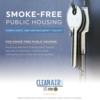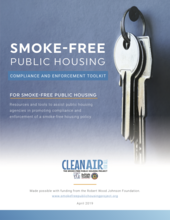0
Publication
Community:
Oct 3, 2019
A majority of property managers report that a smoke-free policy is largely well followed and self enforced by residents and staff. However, it is not uncommon for a small minority of residents to struggle or refuse to comply by continuing to smoke or allowing their guests to smoke on the property. These resources and tools can assist management in promoting compliance and enforcing the policy when necessary. If you would like to consult on solutions specific to your situation, reach out to info@smokefreepublichousingproject.org.
Authored by: Clean Air for All
Topics: Health, Healthy homes, Smoke-free
 Shared by Jackie Siewert
Shared by Jackie Siewert
Jackie Siewert posted a
on Oct 3, 2019
A majority of property managers report that a smoke-free policy is largely well followed and self enforced by residents and staff. However, it is not uncommon for a small minority of residents to struggle or refuse to comply by continuing to smoke or allowing their guests to smoke on the property.
0
Report
Community:
Jun 6, 2019
Trends in Housing Assistance and Who it Serves
Authored by: PAHRC
Topics: Community development, Disabilities, Education, Funding, Health, Homelessness, Housing, Legislation & Policy, Low-income, Partnerships, Research, Seniors, Workforce development, Youth
 Shared by Keely Stater
Shared by Keely Stater
Keely Stater posted a
on Sep 10, 2019
Trends in Housing Assistance and Who it Serves
0
Research
Community:
Aug 5, 2019
CLPHA developed a general data sharing template that public housing authorities (PHAs) and their health partners can customize to suit their data sharing and collaboration needs. Please feel free to comment to share any uses/modifications your organization made to implement into a partnership.
Authored by:
Topics: Affordable Care Act, CLPHA, Community development, Cost effectiveness, Data sharing, Dental, Depression, Dual-eligibles, Funding, Health, Healthy homes, Legislation & Policy, Low-income, Medicaid / Medicare, Mental health, Metrics, MTW, Nutrition, Obesity, Partnerships, Place-based, Preventative care, Racial inequalities, Research, SAMHSA, Smoke-free, Stability, Substance abuse, Supportive housing, Sustainability, TA
 Shared by Steve Lucas
Shared by Steve Lucas
Steve Lucas posted a
on Aug 5, 2019
Disclaimer: This template is provided for informational purposes only and not for the purpose of providing legal advice. You should contact your attorney to obtain advice with respect to any particular issue or question. Use of this template, including its exhibits and attachments, does not create a relationship or any responsibilities between CLPHA and the user.
CLPHA developed a general data sharing template that public housing authorities (PHAs) and their health partners can customize to suit their data sharing and collaboration needs. Please feel free to comment to share any uses/modifications your organization made to implement into a partnership.
0
Policy Brief
Community:
Jun 4, 2019
The Department of Housing and Urban Development (HUD) has announced its intention to roll back protections for transgender people experiencing homelessness. The newly proposed rule, which is in the early stages of the rulemaking process and has not yet been publicly posted to the Federal Register, would allow homeless shelters to discriminate based on gender identity, putting transgender people in danger of violence and further housing instability. This is part of a long string of attacks the Trump administration has directed toward the transgender community, such as implementing the infamous military ban, contributing to a pattern that legally perpetuates discrimination against transgender people in this country.
Authored by: Aastha Uprety for Equal Rights Center
Topics: Health, Homelessness, Housing, Legislation & Policy, Racial inequalities
 Shared by Housing Is
Shared by Housing Is
Housing Is posted a
on Jun 13, 2019
Aastha Uprety for Equal Rights Center
The Department of Housing and Urban Development (HUD) has announced its intention to roll back protections for transgender people experiencing homelessness.
0
Publication
Community:
May 30, 2019
A more regional approach to care is needed – one that involves coordinated, person-centered healthcare with robust connections to social services and community resources. An innovative infrastructure to do just that is underway in four communities across New Jersey: Trenton, Camden, Newark, and Paterson. Efforts begun in 2011 under New Jersey’s Medicaid Accountable Care Organization (ACO) Demonstration Project have evolved into four regional collaboratives that integrate, coordinate, and align all the disconnected programs aimed at making communities healthier.
Authored by: Kathleen Noonan and Jon Tew for Camden Coaliton of Healthcare Providers
Topics: Data sharing, East Coast, Health, Partnerships
 Shared by Housing Is
Shared by Housing Is
Housing Is posted a
on Jun 13, 2019
Kathleen Noonan and Jon Tew for Camden Coaliton of Healthcare Providers
A more regional approach to care is needed – one that involves coordinated, person-centered healthcare with robust connections to social services and community resources.
0
Research
Community:
Mar 25, 2019
The articles below are part of a special collection commemorating 25 years of the Health Care System Research Network’s (HCSRN's) rigorous research to improve health outcomes and health systems’ performance by leveraging electronic health data. This new collection highlights, among other things, advances in personalized cancer care, the optimal use of AI in health care, and the evolution of common data models, featuring work from Kaiser Permanente, Intermountain Healthcare and others.
Authored by: The Journal for Electronic Health Data and Methods
Topics: Data sharing, Health, Partnerships, Research
 Shared by Housing Is
Shared by Housing Is
Housing Is posted a
on Jun 13, 2019
The Journal for Electronic Health Data and Methods
The articles below are part of a special collection commemorating 25 years of the Health Care System Research Network’s (HCSRN's) rigorous research to improve health outcomes and health systems’ performance by leveraging electronic health data.
0
Case study
Community:
May 1, 2019
In 2011, Cleveland had one of the highest rates of childhood lead poisoning in the United States, with almost one of every five children in the city receiving this diagnosis. Childhood asthma rates were also extremely high, especially for children living in poverty, according to 2008 statewide statistics for Ohio. Follow along in this new case study with the Engaging the Community in New Approaches to Healthy Housing (ECNAHH) initiative, part the BUILD Health Challenge’s first cohort, as they worked to reduce the occurrence of asthma, chronic obstructive pulmonary disease (COPD), and lead poisoning related to unhealthy housing conditions in three sub-neighborhoods in Cleveland.
Authored by: The BUILD Health Challenge
Topics: Health, Midwest, Partnerships, Research
 Shared by Housing Is
Shared by Housing Is
Housing Is posted a
on Jun 13, 2019
The BUILD Health Challenge
In 2011, Cleveland had one of the highest rates of childhood lead poisoning in the United States, with almost one of every five children in the city receiving this diagnosis.
0
Webinar
Community:
Jun 5, 2019
This All In webinar will feature projects addressing transportation with a multi-sector data component. FLOURISH: St. Louis, one of the BUILD Health Challenge awardees from St. Louis, MO, will talk about how they are using data to addressing infant mortality through transportation in St. Louis. The Community Transportation Association of America, a national non-profit, will highlight Wheels to Wellness (W2W), a program in Southern Maryland, that allows healthcare staff in rural Maryland to schedule on-demand and pre-scheduled trips using an online portal, and Oklahoma City, OK, who is working with community partners to create a transportation program for parents working towards reunification with their children now in foster care.
Authored by: All In: Data for Community Health
Topics: Data sharing, Health, Partnerships, Racial inequalities, Transportation
 Shared by Housing Is
Shared by Housing Is
Housing Is posted a
on Jun 13, 2019
All In: Data for Community Health
This All In webinar will feature projects addressing transportation with a multi-sector data component. FLOURISH: St. Louis, one of the BUILD Health Challenge awardees from St. Louis, MO, will talk about how they are using data to addressing infant mortality through transportation in St. Louis.
0
Podcast
Community:
Jun 13, 2019
An interview with Emily Yu, MBA, the Executive Director of the BUILD Health Challenge, an All In partner initiative that supports local collaborations between community-based organizations, health departments, and hospitals/health systems that are working to address important health issues in their communities.
Authored by: All In: Data for Community Health
Topics: Data sharing, Health, Partnerships
 Shared by Housing Is
Shared by Housing Is
Housing Is posted a
on Jun 13, 2019
All In: Data for Community Health
An interview with Emily Yu, MBA, the Executive Director of the BUILD Health Challenge, an All In partner initiative that supports local collaborations between community-based organizations, health departments, and hospitals/health systems that are working to address important health issues in their
0
News Article
Community:
Jun 12, 2019
About half of the student body at one Ohio elementary school has witnessed drug use at home. Educators spend time every day teaching the children how to cope.
Authored by: Dan Levin for The New York Times
Topics: Child welfare, Early childhood, Education, Health, Substance abuse, Youth
 Shared by Housing Is
Shared by Housing Is
Housing Is posted a
on Jun 13, 2019
Dan Levin for The New York Times
About half of the student body at one Ohio elementary school has witnessed drug use at home. Educators spend time every day teaching the children how to cope.
0
Publication
Community:
Jun 12, 2019
Zoning rules dictate more than just how we can use and build on land. They also shape our communities and our lives. Land use laws determine where we can find housing, schools, and parks—and who has access to them.
Authored by: Maya Brennan, Emily Peiffer, and Kimberly Burrowes for How Housing Matters, The Urban Institute
Topics: Health, Housing, Legislation & Policy, Racial inequalities
 Shared by Housing Is
Shared by Housing Is
Housing Is posted a
on Jun 13, 2019
Maya Brennan, Emily Peiffer, and Kimberly Burrowes for How Housing Matters, The Urban Institute
Zoning rules dictate more than just how we can use and build on land. They also shape our communities and our lives. Land use laws determine where we can find housing, schools, and parks—and who has access to them.
0
Report
Community:
In 2017, the Bipartisan Policy Center and the Center for Outcomes Research and Education (CORE) spoke with over 90 national thought leaders and stakeholders about the current state of rural health care in the Upper Midwest region, including Iowa, Minnesota, Montana, Nebraska, North Dakota, South Dakota, and Wyoming. BPC and CORE used these discussions to determine the real-world implications of existing federal policies, to understand ongoing care challenges, and to identify opportunities for improvement in rural health care access and delivery.
Authored by: Bipartisan Policy Center
Topics: Health, Low-income, Midwest, Research, Seniors
 Shared by Housing Is
Shared by Housing Is
Housing Is posted a
on Jun 12, 2019
In 2017, the Bipartisan Policy Center and the Center for Outcomes Research and Education (CORE) spoke with over 90 national thought leaders and stakeholders about the current state of rural health care in the Upper Midwest region, including Iowa, Minnesota, Montana, Nebraska, North Dakota, South Dak
0
Publication
Community:
This paper analyzes why SNAP benefits are inadequate, reviews the body of research showing positive effects from more adequate SNAP benefits, and offers key policy solutions to improve benefit adequacy.
Authored by: Food Research & Action Center (FRAC)
Topics: Food insecurity, Health, Legislation & Policy, Low-income, Nutrition, Research
 Shared by Housing Is
Shared by Housing Is
Housing Is posted a
on Jun 11, 2019
Food Research & Action Center (FRAC)
This paper analyzes why SNAP benefits are inadequate, reviews the body of research showing positive effects from more adequate SNAP benefits, and offers key policy solutions to improve benefit adequacy.
0
News Article
Community:
Jun 5, 2019
Patients are dealing with stress related to the social determinants of health, including stable housing, food security, and adequate transportation.
Authored by: Jessica Kent for Health IT Analytics
Topics: Food insecurity, Health, Housing, Low-income, Nutrition, Transportation
 Shared by Housing Is
Shared by Housing Is
Housing Is posted a
on Jun 11, 2019
Jessica Kent for Health IT Analytics
Patients are dealing with stress related to the social determinants of health, including stable housing, food security, and adequate transportation.
0
Report
Community:
May 1, 2019
Protecting and improving the health of pregnant and postpartum women, infants, and young children is critically important. Those eligible for WIC — and frequently their communities and the nation — are facing levels of poverty, food insecurity, inadequate dietary intake, obesity, and ill health that are far too
high. Research shows that WIC can help to alleviate these problems for children, mothers, and their families, and improve overall health and well-being. Yet the program is reaching far too few eligible people: only 3 out of 5. Increasing access to and strengthening WIC is essential to improving nutrition and reducing health disparities in this nation.
Authored by: Food Research & Action Center (FRAC)
Topics: Early childhood, Family engagement, Food insecurity, Funding, Health, Legislation & Policy, Low-income
 Shared by Housing Is
Shared by Housing Is
Housing Is posted a
on Jun 3, 2019
Food Research & Action Center (FRAC)
Protecting and improving the health of pregnant and postpartum women, infants, and young children is critically important.
0
News Article
Community:
Mar 18, 2019
It’s a prescription guaranteed to develop healthy brains, refine motor skills and prepare kids for school, doctors say. But few parents expect a physician to hand their children a book at their first wellness checkup at Nationwide Children’s Hospital in Columbus.
Authored by: Alissa Widman Neese for The Columbus Dispatch
Topics: Child welfare, Early childhood, Education, Health, Literacy, Low-income, Partnerships
 Shared by Housing Is
Shared by Housing Is
Housing Is posted a
on May 30, 2019
Alissa Widman Neese for The Columbus Dispatch
It’s a prescription guaranteed to develop healthy brains, refine motor skills and prepare kids for school, doctors say. But few parents expect a physician to hand their children a book at their first wellness checkup at Nationwide Children’s Hospital in Columbus.
0
Video
Community:
May 24, 2019
With ever-growing interest in the intersection between housing and health, researchers are evaluating the impact of cross-sector interventions. This session will bring together researchers to share insights from their work relevant to practitioners and policymakers.
Authored by: Housing Is, CLPHA
Topics: CLPHA, Health, Homelessness, Housing, Low-income, Partnerships, Research, Seniors
 Shared by Housing Is
Shared by Housing Is
Housing Is posted a
on May 24, 2019
With ever-growing interest in the intersection between housing and health, researchers are evaluating the impact of cross-sector interventions. This session will bring together researchers to share insights from their work relevant to practitioners and policymakers.
0
Video
Community:
May 24, 2019
Dr. Camara Jones, a Senior Fellow at Morehouse School of Medicine and a past president of the American Public Health Association, will discuss systemic, historical inequities that constrict the social safety net and ways cross-sector collaboration can help improve health outcomes, educational attainment, and housing stability.
Authored by: Housing Is, CLPHA
Topics: Health, Housing, Racial inequalities, Research
 Shared by Housing Is
Shared by Housing Is
Housing Is posted a
on May 24, 2019
0
Video
Community:
May 24, 2019
Building Internal PHA Capacity for Cross-Sector Partnerships: How to creatively expand and enhance internal capacity to support cross-sector partnerships.
Authored by: Housing Is, CLPHA
Topics: CLPHA, Education, Health, Housing, Partnerships
 Shared by Housing Is
Shared by Housing Is
Housing Is posted a
on May 24, 2019
Building Internal PHA Capacity for Cross-Sector Partnerships: How to creatively expand and enhance internal capacity to support cross-sector partnerships.
0
Publication
Community:
May 20, 2019
African-Americans are three times more likely to die from asthma as whites. In Philadelphia and elsewhere, how can outcomes improve with changes to housing quality and pollution control?
Authored by: Sophia Newman for Next City
Topics: Asthma, Health, Housing, Low-income, Racial inequalities
 Shared by Housing Is
Shared by Housing Is
Housing Is posted a
on May 23, 2019
Sophia Newman for Next City
African-Americans are three times more likely to die from asthma as whites. In Philadelphia and elsewhere, how can outcomes improve with changes to housing quality and pollution control?
0
Research
Community:
Oct 14, 2017
While homeownership has been linked to positive health outcomes there is limited evidence regarding the conditions under which it may be health protective. We present a conceptual model linking homeownership to health, highlighting key potential pathways. Using the Detroit Metropolitan Area as a case study, and data from the American Community Survey (2009–2013; 5-years estimates) and Michigan Department of Community Health, we tested the following questions: (1) Is neighborhood percentage non-Hispanic Black (NHB) associated with homeownership? (2) Is neighborhood percentage NHB associated with health? (3) Is the association between percentage NHB and health mediated by homeownership? (4) Does neighborhood housing value modify associations between percentage NHB and health, or between homeownership and health?
Authored by: International Journal of Environmental Research and Public Health
Topics: Health, Housing, Research
 Shared by Housing Is
Shared by Housing Is
Housing Is posted a
on May 23, 2019
International Journal of Environmental Research and Public Health
While homeownership has been linked to positive health outcomes there is limited evidence regarding the conditions under which it may be health protective. We present a conceptual model linking homeownership to health, highlighting key potential pathways.
0
Publication
Community:
May 22, 2019
In May 2018, Kaiser Permanente, the largest private integrated care system in the US, announced that it would invest $200 million through its Thriving Communities Fund to address the affordable housing crisis in California’s Bay Area. Then in 2019, Kaiser announced that it used the fund to purchase an apartment building in a diverse but quickly gentrifying neighborhood in Oakland with the express purpose of making repairs and upgrades to improve health in the building and to ensure affordability to current residents. If Kaiser wanted to improve health, why wouldn’t it focus solely on housing upgrades, which research shows can produce positive health outcomes (PDF)? Why would it include maintaining affordability in its mandate?
Authored by: Martha Fedorowicz for How Housing Matters, The Urban Institute
Topics: Health, Housing, Low-income
 Shared by Housing Is
Shared by Housing Is
Housing Is posted a
on May 23, 2019
Martha Fedorowicz for How Housing Matters, The Urban Institute
In May 2018, Kaiser Permanente, the largest private integrated care system in the US, announced that it would invest $200 million through its Thriving Communities Fund to address the affordable housing crisis in California’s Bay Area.
0
News Article
Community:
May 13, 2019
How do you fix health inequity in the United States? The education and health-care communities as well as policymakers must consider what are known as the social determinants of health as an integral part of solving this dilemma. Additionally, communities need to stop thinking of health care as care only received in a medical environment such as a hospital or clinic. Instead we must consider health-care holistically as a service given in our homes, our schools, our workplaces, our parks and our communities. These services are provided by an array of health-care providers, including nurses, physicians, psychologists, dentists, social workers and many more — over 13 million strong.
Authored by: Beverly Malone for The Hill
Topics: Food insecurity, Health, Lead, Legislation & Policy, Nutrition, Racial inequalities, Transportation
 Shared by Housing Is
Shared by Housing Is
Housing Is posted a
on May 20, 2019
Beverly Malone for The Hill
How do you fix health inequity in the United States? The education and health-care communities as well as policymakers must consider what are known as the social determinants of health as an integral part of solving this dilemma.
0
News Article
Community:
May 10, 2019
A decade from now, most middle-income seniors will not be able to pay the rising costs of independent or assisted living.
Authored by: Paula Span for The New York Times
Topics: Health, Legislation & Policy, Low-income, Seniors
 Shared by Housing Is
Shared by Housing Is
Housing Is posted a
on May 20, 2019
Paula Span for The New York Times
A decade from now, most middle-income seniors will not be able to pay the rising costs of independent or assisted living.
0
Report
Community:
May 15, 2019
Where you live is linked to how healthy you are.Sadly, U.S. Latino communities are marked by lower-quality, unaffordable housing, as well as high risk for eviction and displacement. This contributes to health inequities in this population. That’s what we found in our new research review, The State of Latinos and Housing, Transportation, and Green Space, released on May 14, 2019, by my team at Salud America!, a national network for health equity at UT Health San Antonio.
Authored by: Amelie Ramirez for Salud America!, UT Health San Antonio and the National Low Income Housing Coalition
Topics: Health, Housing, Racial inequalities, Research
 Shared by Housing Is
Shared by Housing Is
Housing Is posted a
on May 15, 2019
Amelie Ramirez for Salud America!, UT Health San Antonio and the National Low Income Housing Coalition
Where you live is linked to how healthy you are.Sadly, U.S. Latino communities are marked by lower-quality, unaffordable housing, as well as high risk for eviction and displacement. This contributes to health inequities in this population.


 Shared by Jackie Siewert
on Oct 3, 2019
Shared by Jackie Siewert
on Oct 3, 2019


 Shared by Keely Stater
on Sep 10, 2019
Shared by Keely Stater
on Sep 10, 2019

 Shared by Steve Lucas
on Aug 5, 2019
Shared by Steve Lucas
on Aug 5, 2019
 Shared by Housing Is
on Jun 13, 2019
Shared by Housing Is
on Jun 13, 2019

 Shared by Housing Is
on Jun 13, 2019
Shared by Housing Is
on Jun 13, 2019

 Shared by Housing Is
on Jun 13, 2019
Shared by Housing Is
on Jun 13, 2019
 Shared by Housing Is
on Jun 13, 2019
Shared by Housing Is
on Jun 13, 2019
 Shared by Housing Is
on Jun 13, 2019
Shared by Housing Is
on Jun 13, 2019
 Shared by Housing Is
on Jun 13, 2019
Shared by Housing Is
on Jun 13, 2019

 Shared by Housing Is
on Jun 13, 2019
Shared by Housing Is
on Jun 13, 2019

 Shared by Housing Is
on Jun 13, 2019
Shared by Housing Is
on Jun 13, 2019
 Shared by Housing Is
on Jun 12, 2019
Shared by Housing Is
on Jun 12, 2019

 Shared by Housing Is
on Jun 11, 2019
Shared by Housing Is
on Jun 11, 2019


 Shared by Housing Is
on Jun 11, 2019
Shared by Housing Is
on Jun 11, 2019

 Shared by Housing Is
on Jun 3, 2019
Shared by Housing Is
on Jun 3, 2019
 Shared by Housing Is
on May 30, 2019
Shared by Housing Is
on May 30, 2019

 Shared by Housing Is
on May 24, 2019
Shared by Housing Is
on May 24, 2019


 Shared by Housing Is
on May 24, 2019
Shared by Housing Is
on May 24, 2019

 Shared by Housing Is
on May 24, 2019
Shared by Housing Is
on May 24, 2019

 Shared by Housing Is
on May 23, 2019
Shared by Housing Is
on May 23, 2019
 Shared by Housing Is
on May 23, 2019
Shared by Housing Is
on May 23, 2019
 Shared by Housing Is
on May 23, 2019
Shared by Housing Is
on May 23, 2019

 Shared by Housing Is
on May 20, 2019
Shared by Housing Is
on May 20, 2019


 Shared by Housing Is
on May 20, 2019
Shared by Housing Is
on May 20, 2019

 Shared by Housing Is
on May 15, 2019
Shared by Housing Is
on May 15, 2019